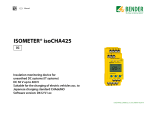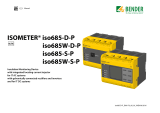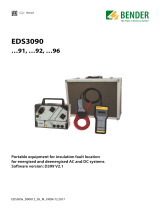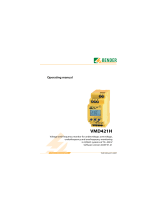
Quickstart DE/EN isoxx1685Dx-x25_D00272_02_Q_DEEN / 04.2019
ISOMETER® isoxx1685Dx-x25
Installationsüberwachungsgerät / Insulation monitoring device

Quick-start guide
This quick-start guide applies to the following
devices:
Intended use
The ISOMETER® monitors the insulation resis-
tance of unearthed AC, AC/DC and DC circuits.
A separate supply voltage allows de-energised
systems to be monitored too. The maximum
permissible system leakage capacitance is up to
2000 μF, dependent on the application-specific
profile.
Safety instructions
I
Danger Risk of electric shock!
The terminals carry high voltage and di-
rect contact with these terminals will like-
ly result in electrocution. If the terminals
L1/+, L2, L3/– of the device are connected
to a live IT system, the terminals E and KE
must not be disconnected from the pro-
tective conductor (PE).
I
Caution of damage to property due to
incorrect installation!
Connecting more than one insulation
monitoring device may result in damage
to the installation. If more than one insu-
lation monitoring device is connected,
the device will not function and will re-
port no insulation fault.
i
This quick-start guide does not replace the
operating manual. You can find the ope-
rating manual on our homepage:
Bestimmungsgemäße Verwendung
Das ISOMETER® überwacht den Isolationswider-
stand von ungeerdeten AC-, AC/DC- und DC-
Stromkreisen.
Die separate Versorgungsspannung ermöglicht
auch die Überwachung eines spannungslosen
Systems. Die maximal zulässige Netzableit-
kapazität beträgt abhängig vom anwendungs-
spezifischen Profil bis zu 2000 μF.
Sicherheitshinweise
I
gefahr eines elektrischen Schlages!
An den Klemmen liegt eine hohe
Spannung an, die bei direkter Berührung
lebensgefährlich ist. Ist das Gerät mit den
Klemmen L1/+, L2, L3/– an ein span-
nungsführendes IT-System angeschlos-
sen, dürfen die Klemmen KE und E nicht
vom Schutzleiter (PE) getrennt werden
I
VorsiCht Sachschaden durch unsach-
gemäße Installation!
Die Anlage kann Schaden nehmen, wenn
Sie mehr als ein Isolationsüberwachungs-
gerät anschließen. Sind mehrere Geräte
angeschlossen, funktioniert das Gerät
nicht und meldet keine Isolationsfehler.
i
Die Kurzanleitung ersetzt nicht das Hand-
buch. Das Handbuch finden Sie auf unse-
rer Homepage:
Kurzanleitung
Diese Kurzanleitung gilt für folgende Geräte:
2 isoxx1685Dx-x25_D00272_02_Q_DEEN / 04.2019
ISOMETER® isoxx1685Dx-x25
Gerät
Device
Überwachtes IT-System
IT system beeing monitored
Messstrom Im
Masuring current Im
Ansprechwerte
Response values
Bestellnummer
Orderingnumber
iso1685DP-425 AC 0…1000 V / DC 0…1500 V ≤1,5 mA 200 Ω…1 MΩ B91065802
isoHV1685D-425 AC 0…2000 V / DC 0…3000 V ≤1,5 mA 200 Ω…1 MΩ B91065805
isoLR1685DP-325 AC 0…690 V / DC 0…690 V ≤3,5 mA 20 Ω…100 kΩ B91065803
https://www.bender.de/service-support/downloadbereich

I
Caution Disconnect from the IT system!
The insulation monitoring device must be
disconnected from the IT system before
insulation or voltage tests are carried out
at the installation. Otherwise the device
may be damaged
i
When the IT system to be monitored con-
tains galvanically coupled DC circuits,
take into consideration that: an insulati-
on fault can only be detected correctly
when the rectifier valves carry a mini-
mum correctly when the rectifier valves
carry a minimum current of > 10 A
Mounting
Minimum distance to adjacent devices:
Lateral 0 mm, top 20 mm, bottom 20 mm!
Install the device by means of four M5 screws,
also refer to the drill holes shown in the dimen-
sion diagram. Align it in such a way that it is
vertically upright during operation and that the
system coupling (L1/+, L2/–) is on top.
I
VorsiCht Trennung vom IT-System!
Bei Isolations- und Spannungsprüfungen
an der Anlage muss das Isolationsüber-
wachungsgerät für die Dauer der Prüfung
vom IT-System getrennt sein. Andernfalls
kann das Gerät Schaden nehmen..
i
Wenn ein überwachtes IT-System galva-
nisch gekoppelte Gleichstromkreise ent-
hält, kann ein Isolationsfehler nur dann
richtig erfasst werden, wenn über die
Gleichrichterventile ein Mindeststrom von
> 10mA fließt.
Montage
Mindestabstand zu benachbarten Geräten:
Seitlich 0 mm, oben 20 mm, unten 20 mm!
Montieren Sie das Gerät mit 4 Schrauben M5,
siehe auch Bohrungen im Maßbild. Richten Sie
es so aus, dass es im Betrieb senkrecht steht und
die Netzankopplung (L1/+, L2/–) oben ist.
ISOMETER® isoxx1685Dx-x25
isoxx1685Dx-x25_D00272_02_Q_DEEN / 04.2019 3
ISOMETER
®
iso1685
PGH ON
246
125 40,5
40,75
51
368
383
401,5
106
64
8,75
5,2
61,8
76,6
39,8
55,7

Connection
Wire up the device according to the wiring dia-
gram taking account of the technical data.
I
Danger Risk of electric shock!
Touching uninsulated live conductors can
result in death or serious injury.
Therefore avoid any physical contact with
active conductors. Ensure compliance
with the regulations for working on elect-
rical installations.
I
Warning Insulation monitoring devices
that do not work correctly!
Connect the terminals KE and E individu-
ally to the protective earth conductor PE.
i
The terminals L1/+ and L2/– are locked.
To detach the terminals, first push the la-
teral orange slider forward (direction of
the device) to unlock the terminal. Then
the terminal can be detached.
Anschluss
Verdrahten Sie das Gerät gemäß Anschluss-
plan. Beachten Sie dabei die technischen Daten.
I
gefahr eines elektrischen Schlages!
Bei Berühren von spannungsführenden
nicht isolierten Leitern können Tod oder
schwere Körperverletzung eintreten.
Vermeiden Sie deshalb jeglichen
Körperkontakt mit aktiven Leitern.
Beachten Sie die Regeln für das Arbeiten
an elektrischen Anlagen.
I
Warnung Nicht korrekt arbeitende
Isolationsüberwachungsgeräte!
Schließen Sie die Klemmen KE und E ge-
trennt mit je einer Leitung an den Schutz-
leiter PE an.
i
Die Klemmen L1/+ und L2/– sind verrie-
gelt. Zum Abziehen der Klemmen müssen
zunächst die seitlichen orangefarbenen
Schieber nach vorne (Richtung Gerät) ge-
schoben werden, um die Klemmen zu ent-
riegeln. Erst dann können die Klemmen
abgezogen werden.
4 isoxx1685Dx-x25_D00272_02_Q_DEEN / 04.2019
ISOMETER® isoxx1685Dx-x25
L1
L2
L3
N
PE
U
n
k I kT IT
U
S
2A
K1
K3
K2
11 12 1421 22 24
2A
1A
1A
BMS
PE
I2+ I2- I 1+ I1-
31 32 34
+
-
CAN1 CAN2 RS-485
Term.
A1 A2
E KE
L2/-
L1/+
A B S
µSDCard
SS8103
1
2
3
4
5
6
7
8
A4
A3
A2
A1
A0
ST6101

Connection
1. Connect terminals E and KE to earth (PE).
2. Connect A and B to the BMS bus.
3. Connect terminal S to the shield of the bus
line (only at the end of the line).
4. Connect terminal L1/+ to L1/+ of the IT sys-
tem (with one 1 A fuse each).
5. Connect terminal L2/– to L2/– of the IT sys-
tem (with one 1 A fuse each).
6. Connect terminal A1/A2 to the supply volta-
ge Us (with one 2 A fuse each).
7. Connect the alarm outputs 11/12/14,
21/22/24 and 31/32/34.
Legend
Terminal Connections
I1–, I1+
I2–, I2+
Congurable digital inputs
(e.g. Test, Reset)
CAN1, CAN2 No function
RS-485 Term. DIP switch for the termination of the
RS-485 interface
A, B, S Serial RS-485 interface
k, l, kT, lT No function
31, 32, 34 Relay output for internal device errors
and connection faults
21, 22, 24 Relay output for alarm insulation fault
11, 12, 14 Relay output for alarm insulation fault
E, KE Separate connections of E (earth)
and KE (control earth) to PE
A1, A2 Connection to U
s
= DC 24 V
L1/+ Coupling terminal L1/+
L2/– Coupling terminal L2/–
SS8103 No function
ST6101 Alarm resetting
µSDCard No function
Anschluss
1. Klemme E und KE an Erde (PE) anschließen.
2. Klemme A und B an BMS-Bus anschließen.
3. Klemme S an den Schirm der Bus-Leitung an-
schließen (nur an einem Ende der Leitung).
4. Klemme L1/+ an L1/+ des IT-Netzes anschlie-
ßen (mit je 1 A-Sicherung).
5. Klemme L2/– an L2/– des IT-Netzes anschlie-
ßen (mit je 1 A-Sicherung).
6. Klemme A1/A2 an die Versorgungsspannung
Us anschließen (mit je 2 A-Sicherung).
7. Meldeausgänge 11/12/14, 21/22/24 und
31/32/34 anschließen.
Legende
Klemme Anschlüsse
I1–, I1+
I2–, I2+
Kongurierbare digitale Eingänge
(z. B. Test, Reset)
CAN1, CAN2 Ohne Funktion
RS-485 Term. DIP-Schalter zur Terminierung der
RS-485-Schnittstelle
A, B, S Serielle Schnittstelle RS-485
k, l, kT, lT Ohne Funktion
31, 32, 34 Relaisausgang für interne Gerätefehler
und Anschlussfehler
21, 22, 24 Relaisausgang für Alarm Isolationsfehler
11, 12, 14 Relaisausgang für Alarm Isolationsfehler
E, KE Separate Anschlüsse von E (Erde)
und KE (Kontrollerde) an PE
A1, A2 Versorgungsspannung U
s
DC 24 V
L1/+ Ankopplung Klemme L1/+
L2/– Ankopplung Klemme L2/–
SS8103 Ohne Funktion
ST6101 Rücksetzen von Alarmen
µSDCard Ohne Funktion
ISOMETER® isoxx1685Dx-x25
isoxx1685Dx-x25_D00272_02_Q_DEEN / 04.2019 5

Commissioning of the device
1. Check that the ISOMETER® is properly con-
nected to the system to be monitored.
2. Connect the supply voltage to the
ISOMETER®.
3. Set parameters
Execute the commissioning wizard. For initial
commissioning, the commissioning wizard
will be started automatically, but can also be
started via the device menu.
4. The device carries out a self test.
After the completion of the test, the measu-
red insulation resistance is shown on the dis-
play. If the value exceeds the response va-
lues indicated at the bottom of the display,
the message „OK“ will additionally be di-
splayed. If a fault is detected during the self
test, a fault message will appear on the dis-
play.
5. Check the function using a genuine in-
sulation fault.Check the ISOMETER® in the
system being monitored, e.g. using a suita-
ble resistance against earth.
i
The profile „power circuits“ is suitable for
most of the IT systems. For a description of
the profiles refer to the manual.
Operation
EDS
Opens the EDS menu.
Moves up in a list or increases a value.
MENU
ESC
Opens the device menu.
Aborts the current process or moves one step back
in the device menu.
RESET
Resets messages.
Navigates back (e.g. to the previous setting) or
selects a parameter.
TEST
Carry out a self test.
Navigates forward (e.g. to the next setting) or
selects a parameter.
Inbetriebnahme
1. Prüfen auf korrekten Anschluss des
ISOMETER®s an das zu überwachende Netz.
2. Versorgungsspannung für ISOMETER® zu-
schalten.
3. Einstellungen vornehmen
Inbetriebnahme-Assistent durchlaufen.
Dieser wird bei Erstinbetriebnahme automa-
tisch gestartet oder kann über das
Gerätemenü aufgerufen werden.
4. Das Gerät führt einen Selbsttest durch.
Nach Ende des Tests erscheint im Display der
ermittelte Isolationswiderstand. Liegt er über
den in der untersten Zeile eingeblendeten
Ansprechwerten, wird zusätzlich die
Meldung „OK“ angezeigt. Wird während des
Selbsttests ein Fehler erkannt, erscheint im
Display eine Fehlermeldung.
5. Funktion mit einem echten Isolationsfehler
prüfen. Das ISOMETER® ist am überwachten
Netz z. B. mit einem für die Netzspannung
geeigneten Widerstand gegen Erde zu prü-
fen.
i
Das Profil „Leistungskreise“ ist für die
meisten IT-Systeme geeignet. Eine
Beschreibung finden Sie im Handbuch.
Bedienung
EDS
Önet das EDS-Menü.
Navigiert in einer Liste nach oben oder erhöht
einen Wert.
MENU
ESC
Önet das Gerätemenü.
Bricht den aktuellen Vorgang ab oder navigiert im
Gerätemenü einen Schritt zurück.
RESET
Setzt Meldungen zurück.
Navigiert zurück (zum vorherigen Einstellungs-
schritt) oder wählt Parameter aus.
TEST
Führt einen Selbsttest durch.
Navigiert nach vorne (zum nächsten Schritt) oder
wählt Parameter aus.
6 isoxx1685Dx-x25_D00272_02_Q_DEEN / 04.2019
ISOMETER® isoxx1685Dx-x25

DATA
Indicates data and values.
Moves down in a list or reduces a value.
INFO
OK
Displays information.
Conrms an action or a selection.
The Alarm and its effect
Cause of the alarm
– The measured insulation resistance is below the
response value „Alarm 1“ or „Alarm 2“.
LED ALARM 1 and/or ALARM 2 flashes.
– Connection fault system or earth.
LEDs ALARM1 and ALARM2 blink simultaneously.
– Device error. LED SERVICE flashes.
Sequence of events during an alarm
– The display indicates a fault and, as the case may
be, a measured value.
– In the case of „ALARM 1“ or „ALARM 2“ the asso-
ciated LEDs flash.
– An alarm sounds at intervals, if previously assig-
ned.
– Assigned alarm relays switch.
– An alarm message is sent on the BMS bus.
Reset alarm messages (Reset)
Requirement: The cause of the alarm is no lon-
ger present. The insulation resistance must be
at least 25 % higher than the response value.
Select: “RESET“ ““ “OK“.
Technical data
Insulation coordination (IEC 60664-1/IEC 60664-3)
Rated impulse voltage ...................................................... 10 kV
Rated impulse voltage [isoHV1685D] ........................... 16,67 kV
Rated insulation voltage ................................................. 1500 V
Rated insulation voltage [isoHV1685D] ........................... 3000 V
Oervoltage category (OVC) ........................................................ III
Voltage test, routine test (IEC 61010-1) ........................... 2.2 kV
Supply voltage
Supply voltage range U
s ..........................................DC 18…30 V
DATA
Zeigt Daten und Werte an.
Navigiert in einer Liste nach unten oder reduziert
einen Wert.
INFO
OK
Zeigt Informationen an
Bestätigt eine Aktion oder Auswahl.
Der Alarm und seine Wirkung
Ursachen einer Alarmmeldung
– Gemessener Isolationswiderstand unterschreitet
Ansprechwerte „Alarm 1“ bzw. „Alarm 2“.
LED ALARM 1 bzw. ALARM 2 leuchtet.
– Anschlussfehler Netz bzw. Erde.
LEDs ALARM 1 und ALARM 2 blinken im
Gleichtakt.
– Gerätefehler. LED SERVICE leuchtet.
Ablauf einer Alarmmeldung
– Display zeigt Fehler und ggf. Messwert an.
– Bei „ALARM 1“ bzw. „ALARM 2“ leuchten die zu-
gehörigen LEDs.
– Alarmton ertönt intervallweise, wenn zugeord-
net.
– Zugeordnete Alarmrelais schalten.
– Auf BMS-Bus wird eine Alarmmeldung gesendet.
Alarmmeldungen zurücksetzen (Reset)
Voraussetzung: Ursache für Alarmmeldung be-
steht nicht mehr. Isolationswiderstand muss
mindestens 25 % über dem Ansprechwert lie-
gen.
Wählen Sie: „RESET“ „“ „OK“.
Technische Daten
Isolationskoordination (IEC 60664-1/IEC 60664-3)
Bemessungs-Stoßspannung ............................................... 10 kV
Bemessungs-Stoßspannung [isoHV1685D]....................16,67 kV
Bemessungs-Isolationsspannung .....................................1500 V
Bemessungs-Isolationsspannung [isoHV1685D] .............. 3000 V
Überspannungskategorie (OVC) ................................................ III
Spannungsprüfung, Stückprüfung (IEC 61010-1) .............2,2 kV
Versorgungsspannung
Versorgungsspannungsbereich U
s ......................... DC 18…30 V
ISOMETER® isoxx1685Dx-x25
isoxx1685Dx-x25_D00272_02_Q_DEEN / 04.2019 7

IT System beeing monitored
Tolerance of U
n .......................................... AC +10 % / DC +5%
Frequency range of U
n .........................................DC, 1…460 Hz
Measuring circuit
Measuring voltage Um (peak) .......................................... ±50 V
Internal resistance DC R
i ..................................................≥ 70 kΩ
Internal resistance DC R
i [isoLR1685DP] .........................≥ 15 kΩ
Permissible extr. DC voltage U
fg [iso1685DP] ...........≤ DC 1600 V
Permissible extr. DC voltage U
fg [isoHV1685D] ........≤ DC 3150 V
Permissible extr. DC voltage U
fg [isoLR1685DP] ......... ≤ DC 720 V
Permissible system leakage capacitance C
e .................................
profile and device dependent .................................. 0…2000 μF
Interfaces
Interface/protocol .............................. RS-485/BMS/Modbus RTU
Measuring circuit for ins. fault location [isoxx1685DP]
Locating current I
L DC ....................................................≤ 50 mA
Test cycle/Pause ................................................................. 2 s/4 s
Switching elements
Switching elements 3 changeover contacts:
K1 .......................................................(insulation fault Alarm 1)
K2 .......................................................(insulation fault Alarm 2)
K3 ...........................................................................(device error)
Contact data acc. to IEC 60947-5-1
Rated insulation voltage .................................................... 250 V
Minimum contact rating .......................... 1 mA at AC/DC ≥ 10 V
Other
EMC .......................................................................IEC 61326-2-4
Degree of protection, built-in components (DIN EN 60529) IP30
Degree of protection, terminals (DIN EN 60529) ................. IP20
Überwachtes IT System
Toleranz von U
n ..........................................AC +10 % / DC +5%
Frequenzbereich von U
n ..................................... DC, 1…460 Hz
Messkreis
Messspannung Um (Spitzenwert) ...................................... ±50 V
Innenwiderstand DC R
i ....................................................≥ 70 kΩ
Innenwiderstand DC R
i [isoLR1685DP] ............................≥ 15 kΩ
Zul. Fremdgleichspannung U
fg [iso1685DP] .............≤ DC 1600 V
Zul. Fremdgleichspannung U
fg [isoHV1685D] ..........≤ DC 3150 V
Zul. Fremdgleichspannung U
fg [isoLR1685DP] ...........≤ DC 720 V
Zulässige Netzableitkapazität C
e ..................................................
profil- und geräteabhängig .....................................0…2000 μF
Schnittstellen
Schnittstelle/Protokoll ....................... RS-485/BMS/Modbus RTU
Messkreis für Isolationsfehlersuche [isoxx1685DP]
Prüfstrom I
L DC ..............................................................≤ 50 mA
Prüftakt/Pause ................................................................... 2 s/4 s
Schaltglieder
Schaltglieder 3 Wechsler:
K1 .......................................................(Isolationsfehler, Alarm 1)
K2 .......................................................(Isolationsfehler, Alarm 2)
K3 ..........................................................................(Gerätefehler)
Kontaktdaten nach IEC 60947-5-1
Bemessungsisolationsspannung ........................................ 250 V
Minimale Kontaktbelastbarkeit .............. 1 mA bei AC/DC ≥10 V
Sonstiges
EMV .......................................................................IEC 61326-2-4
Schutzart Einbauten (DIN EN 60529) ....................................IP30
Schutzart Klemmen (DIN EN 60529) .....................................IP30
Alle Rechte vorbehalten.
Nachdruck und Vervielfältigung
nur mit Genehmigung des Herausgebers.
Bender GmbH & Co. KG
Postfach 1161 • 35301 Grünberg • Deutschland
Londorfer Str. 65 • 35305 Grünberg • Deutschland
Tel.: +49 6401 807-0 • Fax: +49 6401 807-259
E-Mail: [email protected] • www.bender.de
All rights reserved.
Reprinting and duplicating
only with permission of the publisher.
Bender GmbH & Co. KG
PO Box 1161 • 35301 Gruenberg • Germany
Londorfer Str. 65 • 35305 Gruenberg • Germany
Tel.: +49 6401 807-0 • Fax: +49 6401 807-259
E-Mail: [email protected] • www.bender.de
isoxx1685Dx-x25_D00272_02_Q_DEEN / 04.2019/ pdf / © Bender GmbH & Co. KG, Germany – Subject to change! The specied standards take into account the edition valid until 04/2019 unless otherwise indicated.
/








